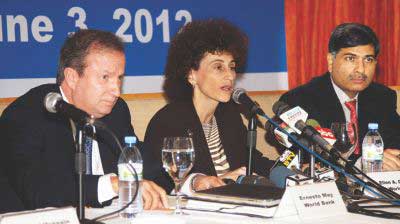Efforts on to unlock $16b foreign aid: WB World Bank warns Bangladesh of risks stemming from Europe crisis
 World Bank Country Director Ellen Goldstein, middle, speaks at the launch of the lending agency's economic outlook report on Bangladesh at the Westin Hotel in Dhaka yesterday.
World Bank Country Director Ellen Goldstein, middle, speaks at the launch of the lending agency's economic outlook report on Bangladesh at the Westin Hotel in Dhaka yesterday.
The government and development partners are working on resolving the issues that have been holding back the disbursement of foreign aid of more than $16 billion, a top economist of the World Bank said yesterday.
“This is not very easy to fix, though,” Sanjay Kathuria, the WB's lead economist, said after launching the lending agency's economic outlook report on Bangladesh at the Westin Hotel in Dhaka yesterday.
The economist said most of the aid is tied with former projects that have various problems ranging from procurement to financial management.
“Issues of both sides are on our desks. We are working.,” said Kathuria, citing a recent high-level meeting between the parties.
The government is facing shortage of funds and hence cannot implement big infrastructure projects, like the Padma Bridge, Dhaka-Chittagong four lane highways and elevated expressway.
On the other hand, foreign aid in pipeline has reached as high as $16.61 billion as on March 31, according to Economic Relations Division.
The WB economist also talked about the poor levels of foreign direct investment (FDI) in Bangladesh.
“General environment for FDI is not very good here. Investors want transparent regulations, land and skilled people,” said Kathuria.
On allowing nine more new banks, the economist said the country has more than enough banks, and many of them are facing a liquidity crisis at the moment, he said.
“How the regulator supervises this big number of banks will be very challenging,” he said.
Kathuria also urged the government to go for more tariff liberalisation, which he said has been on the reverse trend for the past three years.
GLOBAL HEADWINDS
Zahid Hussain, a senior economist at the WB's Dhaka office, said the Bangladesh economy is facing four challenges -- three from external and one from internal aspects. These are: Eurozone crisis, turmoil in Gulf countries and oil price volatility; and energy crisis from the internal side.
A further deepening of the euro area crisis will put Bangladesh's economy at risk, Ellen Goldstein, country director of the World Bank for Bangladesh, said in a statement.
While Bangladesh's most recent economic growth is “quite healthy by developing country standards,” several headwinds could derail growth in near future, she said.
“The spillover effects of eurozone recession and oil price increases pose most serious downside risks to the economy,” she said.
Bangladesh's economic growth slowed to 6.3 percent in the fiscal year ending June 30, compared with 6.7 percent the previous year, according to provisional data from the Bangladesh Bureau of Statistics.
The economic outlook report also mentions the expansionary monetary and fiscal policies that have heightened inflationary pressures. Overall inflation is in double digits and non-food prices accelerated 14 percent in March 2012, compared to 4.3 percent a year earlier.
With exports starting to decline in March 2012, the WB said pressure on the balance of payments could intensify.
The current account surplus during July-March of this fiscal year was $456 million, when it stood at nearly $710 million during the same period last year. This is due to a sharp rise in petroleum-product imports needed to feed the liquid fuel-based power plants.
“The combination of current levels of inflation, the fiscal deficit and reserves mean that Bangladesh has very little policy space to respond to the crisis, unlike its situation during the last global economic and financial crises,” it said.
The Daily Star/Bangladesh/ 4th June 2012
Other Posts
- DBBL, Airtel, Bitopi deal on salary payment
- Trust Bank plans to reach the unbanked Chief Executive Officer Shah Alam Sarwar shares its future plans with The Daily Star
- New chair, vice chair of SIBL elected
- Conventional banking based on ‘fragile structure’: Atiur
- WB terms 6.3pc GDP growth as healthy
- Bangladesh's per capita income rises to $848
- Wealth tax stays in FY13
- PD banks getting raw deal in inter-bank repo market
- Islamic banks get separate call money market
- ECB may cut rates as eurozone crisis deepens




Comments